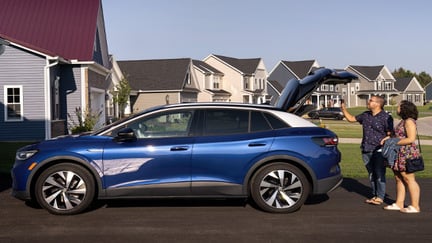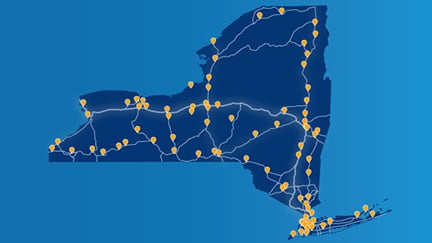There are several ways to charge your electric vehicle (EV) — whether at home, at work, or on the go. Much like the way most of us charge our smartphones at home while we sleep, most EV owners charge their cars during overnight hours just a few times per week. But even if you don’t have access to charging where you park, you still have several readily available options. Here’s the information you need to get going with the three types of charging, as well as installing home charging equipment:
Every EV comes with a 120 volt or “Level 1” portable charging cord. It uses a conventional three-pronged plug that can plug into any properly grounded socket. It typically provides about three to five miles for every hour of charging; an eight-to-14-hour charge is usually needed to support the average American’s 40-mile daily commute.
Most public and workplace charging stations, and many home charging stations, operate at 240 volts and have fixed cables that connect to your car. These Level 2 chargers typically provide about 25 miles of range per hour of charging.
To install a Level 2 station at your home, an electrician will install wiring similar to that used for large appliances, such as an electric stove or clothes dryer (see below for guidance on how to choose the right home charger).
DC fast charging generally provides close to a full charge in under an hour. EVolve NY’s fast chargers are powerful enough to recharge vehicles in 15 to 30 minutes. Public DC fast chargers, often located along major travel corridors and in shopping plazas, are used when EV drivers need to recharge quickly, such as during long trips or weekly shopping routines. Virtually all new fully electric cars are capable of fast charging, while plug-in hybrid cars that also have gas tanks tend not to be equipped with fast charging. Be sure to review your vehicle’s capabilities to know whether it’s compatible.
DC fast chargers have three kinds of plugs:
- CHAdeMO: Used by the Nissan Leaf and Mitsubishi EVs.
- CCS: Used by all U.S. automakers except Tesla, all European automakers, and some Asian automakers (including Nissan for its upcoming electric SUV).
- Tesla Supercharger: Used only by Tesla at Tesla’s dedicated network of high-powered fast-charging stations.
All EVolve NY stations are available to all non-Tesla Evs capable of fast charging. Select locations will also have Tesla adapters.
Some public chargers are equipped with credit card readers, while others use web-based applications (apps) or RFID cards that may require you to first subscribe to the network that operates the charger. EVolve NY’s DC fast chargers all have the option of using credit card readers and won’t require any network subscriptions.
If you don’t have access to home charging, you’ll need to seek out workplace or public charging options. You can locate public chargers using smartphone apps such as PlugShare, ChargeHub, Chargeway, Google Maps or the U.S. Department of Energy's Alternative Fuels Data Center.
- Many of the latest EVs offer the option to coordinate home charger installation through your dealer at the time of purchase. Check with your local dealer first to see whether this is an option.
- If not, research charging station options. It’s important to choose home charging equipment that is tested for safety (“UL Listed” is the most common) as well as operability. The U.S. Department of Energy offers a useful directory of Level 2 equipment.
- Contact one or more electricians for quotes. Check with your dealer, as some brands have partnerships with EV home charging comparison platforms (such as Qmerit) to get multiple quotes from licensed electricians.
- Ensure your local electrician has all necessary permits.
- Purchase a charging station and arrange installation, ideally before delivery of your car.
- Check with your local utility provider as they may offer incentive programs for rebates and rewards.

Now that she and her husband have their own home, Carly Alicea has her own charging station for her EV. She also uses the charging stations at her new job.



Now that she and her husband have their own home, Carly Alicea has her own charging station for her EV. She also uses the charging stations at her new job.








